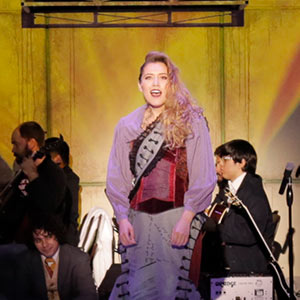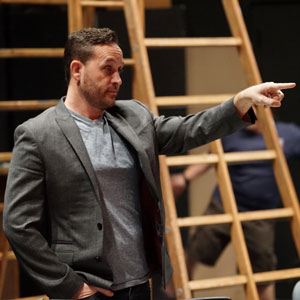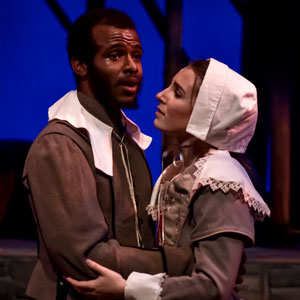Actors Prepare to Produce Moliere
— Fullerton College Hornet - Wes Nease - Wednesday, April 23rd, 2008The Fullerton College Theatre Arts Department is no stranger to the outlandish or the original, but the upcoming production of Moliere's "Tartuffe" promises to raise eyebrows with an entirely innovative presentation.
Originally produced in 1664 at Versaille Palace in France,"Tartuffe" was almost immediately banned by Louis XIV, the King of France, after calls by the Roman Catholic Church to have the play suppressed.
The show focuses on the story of Tartuffe, a wandering vagrant who takes advantage of a wealthy friend by the name of Orgon, under the guise of being a pious and heavily religious man.
As the piece progresses,Tartuffe's religious hypocrisy is made more and more apparent to those around him as he attempts to wrest both money and power from Orgon.
"This play was banned whe they first produced it because of the attack it makes on religious hypocrisy, on the church's power," said Chuck Ketter, director of the FC production. "It wasn't until the King released that ban years later that the show was allowed to perform and then it was so popular that it's been known as [one of
Moliere's] most popular pieces ever since."
Ketter feels that Moliere's original message behind the play, a warning against hypocrisy, is one that should still be heeded today.
"Religious hypocrisy is nothing new, it's been around forever, as have all sorts of hypocrisies. It just so happens that that's the major establishment that it attacks," Ketter said, "I think it is fairly timely in the political world right now."
However, where Moliere was criticizing the Roman Catholic Church with his original work, Ketter saw an opportunity to expand the piece and its meaning even further.
"I wanted to take this piece and not just focus on Christianity and the western establishment, I wanted it to have a more universal theme in its message," Ketter said. "So, I was thinking about setting it in a more eastern universe, an all encompassing free-for-all."
Utilizing components from both the original farce style in which "Tartuffe" was first presented and traditional Japanese Kabuki theater, Ketter hopes to attract a wide audience with the heavily-stylized costuming and set design.
Citing anime as an influence in the design for the production, the show offers new and interesting experiences for the cast.
"I'm looking forward to the costumes," said Carla Melinna, who
plays the part of Mariane. "Just [having practiced] with the shoes and the costume and the wig, I'm excited about that. It's a challenge."
Ryan Knight, who will be playing the part of Valere, agrees.
"With a project like this, which is taking on classical as well as outlandish creativity, when a director actually gives you this and says you can do what you want, it really opens up a new creative flow," said Knight.
At the heart of the production however, it will still be a classical play, an aspect of the production that Michael Ornelas, who plays Tartuffe, has been focusing on.
"I hope to make it understandable. It's really easy to just read a classical piece and for it to go over your head," said Ornelas. "I'm hoping that I bring some sort of clarity and I hope that it gets across."
At the end of the day, Ketter believes that all the challenges of this production are well worth the effort.
"I never want to do any play that I can, if that makes sense," he said. "I want to push my boundaries; I want the actors and the students to push theirs. Success and failure are really not in the equation for me. It's a matter of [whether or not] we go as far as we can with our skills, with our talents, with our limitations, with our budget - do we go and tackle it and do we bring clarity to those choices and make it work? That's all I can hope for."








